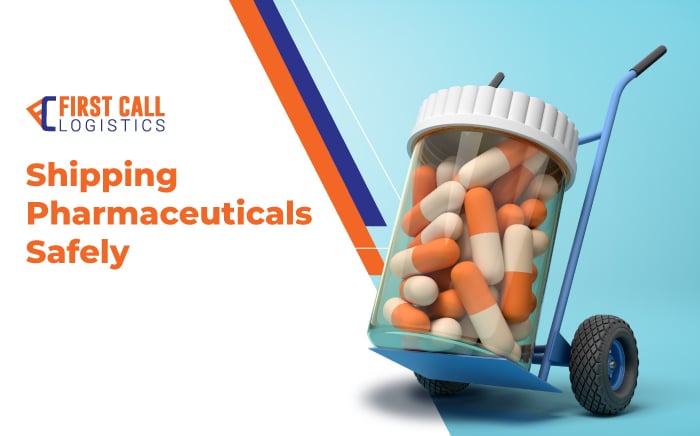Shipping Pharmaceuticals Safely

Pharmaceutical logistics maintains a strict code of regulations to ensure prescription drugs and vaccines are safely delivered without spoiling or losing potency. As you might expect, balancing such a delicate supply chain is a challenging task — professional shippers are required to uphold cold chain procedures, provide added security to prevent theft in transit, and understand special precautions needed to move specialized pharma products.
Mismanaged pharma shipping can put shipments and the health of others at risk. Here are some of the basics you’ll need to know when it comes to shipping pharmaceuticals and why it pays to trust true professionals when it comes to transporting specialized products.
Rules and Regulations for Shipping Pharmaceuticals
Regulatory requirements for the packing, labeling, and transporting of pharmaceuticals are set forth by the Food and Drug Administration (FDA) and the Current Good Manufacturing Practices (CGMP). Standardizing the rules of pharma transport prevents shippers without the right vehicle equipment or training from losing the product.
The full code of federal regulations can be found right here (though it’s not exactly what you’d call light reading). These regulations span everything from specific vehicle designs and temperature-control capabilities to maintaining spotless cargo areas to ward off potential contamination. As with other time-sensitive or hazardous materials, all those involved in handling drugs, vaccines, and sensitive pharma products need documented training for such jobs on file. Most of these regulations will fall into these categories:
- Temperature control: Some drugs are useless or even hazardous if the environment isn’t controlled to exact specifications.
- Cleanliness: Trucks, warehouses, and anywhere else pharma products spend time can’t risk contamination.
- Protection: Pharma products can be small, addictive, and expensive — a prime target for theft. Shipments of opioids are particularly susceptible if strict security measures aren’t followed to the letter. This category includes making sure drug products arrive at hospitals and pharmacies with unbroken seals.
- Documentation: In the shipping industry, if it isn’t recorded then it didn’t happen. That means all training designed to adhere to the categories above needs to be on record and accessible.
Maintaining Cold Chain Integrity from Start to Finish
Maintaining a drug or vaccine’s optimal temperature range from the time it leaves its manufacturer all the way to the end consumer is just as critical as delivery to the correct destination. There are several points along the cold chain where entire shipments can be compromised even if proper procedures and temperature ranges are observed, including accidents, mishandled product, and unforeseen road or weather hazards delaying transit.
The moment a product leaves its manufacturer, it becomes a shipper’s responsibility to hold these products to specific temperatures at every stage of transportation, storage, and final delivery. Trucks need to be properly refrigerated and insulated so temperatures don’t fluctuate in transit, and warehouses need similarly exacting temperature control to maintain chilled product integrity. The product’s packaging itself should be insulated against temperature, sunlight, and humidity changes.
When medicines are ultimately delivered to their end destinations, they should be as fresh and stable as the day they left the manufacturer.
Shielding Pharmaceutical Shipments from Theft
Shipping drugs and medicines might mean beefing up security along the route to ensure safe delivery. Assessing weak points along the supply chain is crucial to avoiding theft. Drivers, warehouse workers, and other staff should be able to quickly identify potential threats or breaks in typical procedure. Here are few other pro tips for maintaining tight security:
- Limit stops. The less time a shipment spends sitting in one place, the better.
- Double-check driver IDs. Ask for identification at pickup and delivery points and forward photos and physical descriptions of drivers and their trucks ahead for extra verification.
- Keep the product under lock and key. Ensure the physical protection afforded by locked trucks and warehouses don’t present an easy crime of opportunity.
- Use hard-sided trailers. It might seem simple, but physical barriers are an effective deterrent.
- Equip trucks with GPS tracking. Transmitting your shipment’s location in real-time can help you catch on quickly when a truck is off-route or making an unplanned stops.
It Pays to Partner with an Experienced Professional
Delivering prescription medicines and drugs is an important job and should only be trusted to a third-party logistics company (3PL) with a proven track record of reliability. An experienced 3PL understands the necessary security requirements, precautions, and cold chain logistics needed to successfully deliver pharmaceutical products without incident.
Talk to our team of experts at First Call today for quotes, careers, and more info on pharma logistics.
Simplify your Next Shipment with First Call Logistics
Building and managing cost-efficient supply chains is a full-time job. First Call’s rare combination of in-house assets, expert problem-solving and track record of stellar customer service makes us the 3PL of choice for business partners with a wide range of shipping needs.
More Resources for FCL Shippers:
- Business Against Logistics Fraud
- Article: How to Protect Your Supply Chain From Cargo Theft
- Article: Three Keys to Managing High Value Transport
- Article: The Shipper’s Guide to Licenses and Endorsements
- Article: Trends & Innovations in Final Mile Delivery Services
- Article: An Introduction to Temperature-Controlled Shipping
- Article: The Ins and Outs of Expedited Freight Shipping
- Article: Refrigerated LTL Shipments: What You Need to Know
- Article: Effective LTL Freight Strategies
Get the latest supply chain news and updates directly to your inbox.